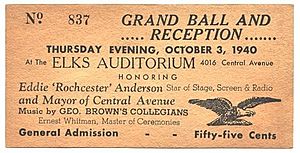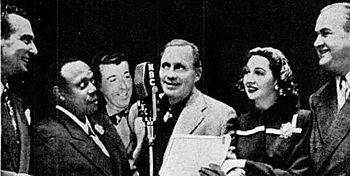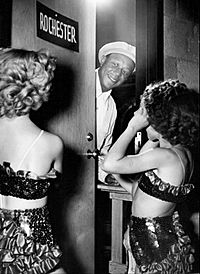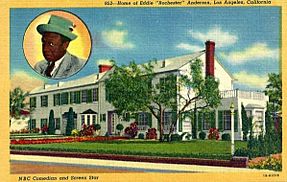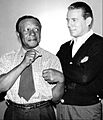Eddie "Rochester" Anderson facts for kids
Quick facts for kids
Eddie Anderson
|
|
|---|---|
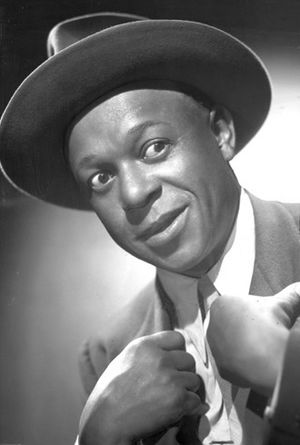
Anderson as Rochester, c. 1947
|
|
| Born |
Edmund Lincoln Anderson
September 18, 1905 Oakland, California, U.S.
|
| Died | February 28, 1977 (aged 71) Los Angeles, California, U.S.
|
| Resting place | Evergreen Cemetery, Los Angeles, California |
| Nationality | American |
| Other names | Eddie "Rochester" Anderson Rochester |
| Occupation | Comedian, actor |
| Years active | 1919–1973 |
| Known for | Rochester Van Jones on The Jack Benny Program |
| Spouse(s) |
Mamie Wiggins Nelson
(m. 1939; died 1954)Eva Simon
(m. 1956; div. 1973) |
| Children | 4 |
Edmund Lincoln Anderson (born September 18, 1905 – died February 28, 1977) was a famous American comedian and actor. Many people knew him as "Rochester" from early radio and television shows.
Anderson started in entertainment as a teenager. He performed in vaudeville, which was a popular type of stage show. In the 1930s, he began working in movies and on the radio. In 1937, he got the role of Rochester van Jones, who was the valet (a personal assistant) for the comedian Jack Benny. This was on Benny's radio show, The Jack Benny Program.
Eddie Anderson made history as the first African American to have a regular role on a radio show that was broadcast all over the country. When the show moved to television in 1950, Anderson continued playing Rochester until 1965. After the show ended, he still acted in TV shows and did voice work for cartoons. He also loved horse racing and owned several racehorses. He even worked as a horse trainer. Anderson was married twice and had four children. He passed away in 1977 at age 71.
Contents
Early life
Eddie Anderson was born in Oakland, California. His father, "Big Ed" Anderson, was a performer in minstrel shows. His mother, Ella Mae, was a tightrope walker. She had to stop her career after a fall. Eddie said his family were descendants of slaves who escaped to freedom during the American Civil War.
When Eddie was ten, his family moved to San Francisco. He left school at 14 to work and help his family. Eddie loved the stage from a young age. He spent his free time watching performers and practicing with his brother, Cornelius. He even tried being a jockey, but he grew too big for it.
Eddie started in show business at 14 in an all-African American show. He had already won a talent contest in San Francisco. He joined different shows as a dancer. Later, he added comedy to his song and dance acts. He first met Jack Benny during one of his tours, but they only said hello.
When Eddie was young, he sold newspapers in San Francisco. Newsboys would shout loudly to sell more papers. This damaged his vocal cords, giving him the unique, gravelly voice that became famous. Even though he started as a dancer, his special voice helped him become a star.
Career
The Jack Benny Program
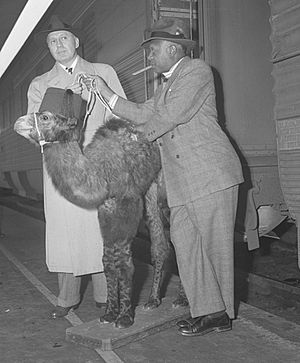
Eddie Anderson first appeared on The Jack Benny Program on March 28, 1937. He was hired for a one-time role as a train porter. The show was moving from New York back to Hollywood. Jack Benny and his writers wanted a funny scene on a train. They wanted a porter who could outsmart Benny.
Benny's first choice for the role was too expensive. So, Eddie Anderson, who was a comedian in Los Angeles, got the part after an audition. In their first scene, Benny and Anderson had a funny conversation. There was also a running joke where Benny asked about arriving in Albuquerque, and Anderson would act like such a place didn't exist.
After this first appearance, Anderson was called back for other small roles. The audience loved him and sent a lot of mail to the show. Because of this, Jack Benny decided to make Anderson a regular cast member. He became Benny's butler and valet, named Rochester van Jones.
Neither Benny nor Anderson could remember how they came up with the name "Rochester." Anderson always said Benny created the name. When Anderson became a regular, he was the first African American to have a steady role on a national radio show. He first appeared as "Rochester" on June 20, 1937.
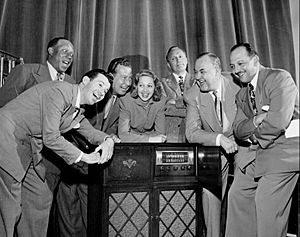
Later episodes gave different stories about how Rochester met Benny. In one radio show, Rochester used to work for the comedy duo Amos 'n' Andy. Benny and Rochester crashed their cars. Benny was at fault, but he blamed Rochester. Amos 'n' Andy then "gave" Rochester to Benny to settle the problem. A TV show later said Benny met Rochester when he was a train porter. Benny caused Rochester to lose his job, then hired him as his valet to make up for it.
Benny often had trouble with Anderson being late for the show. Benny tried to make him on time by fining him $50 each time. Anderson sometimes lost track of time, especially when talking to people. Other cast members would try to help him be on time. Sometimes, they even had to leave without him.
One time, the whole show was going to New York. Anderson was out late the night before. He missed the train in Los Angeles. With a police escort, he sped to the next station in Pasadena. He just made it onto the train there.
Popularity
The Rochester character became very popular. In 1940, Anderson was invited to a party at Harvard University. But students from a rival school, Massachusetts Institute of Technology, tricked him and delayed him. When Harvard students found out, a fight broke out between the two schools. After World War II, Rochester was almost as popular as Jack Benny himself. He usually got the loudest applause when he entered or left the stage.
When The Jack Benny Program moved to CBS Radio in 1949, Rochester's popularity was clear. On the first show, other characters joked that Benny was "nothing without Rochester."
Jack Benny and Rochester had many running jokes. These often involved Rochester trying to avoid work. He also liked to go to Central Avenue to have fun. Benny's cheapness was another common joke. Rochester once said he had to buy a toothbrush "on the installment plan." He also joked about his low pay. He said Benny would deduct so much from his salary that there was nothing left.
Mayor of Central Avenue
Eddie Anderson grew up in Oakland but moved to Los Angeles in the 1930s to find work in films. When he became famous on the Benny radio show, the local African American community was very proud of him. For many years, people in the Central Avenue area of Los Angeles held pretend elections. The winner was called "the Mayor of Central Avenue." This person had the right to speak about issues important to the community.
In May 1940, Eddie "Rochester" Anderson asked for votes to become Mayor of Central Avenue. He campaigned on real issues, like the need for African Americans to serve as aviators (pilots) in the military. He was very serious about this. He took flying lessons and spoke about the need for Black aviators. After Anderson announced his campaign, President Franklin D. Roosevelt also spoke about building up the air force. On Election Day, Anderson won the title.
Changes in how race was shown
In Eddie Anderson's time, Black actors often played servant roles. This was common in entertainment. Early shows sometimes used stereotypes, which were unfair and simple ideas about Black people. These ideas came from old minstrel shows, where white actors would paint their faces black and act out lazy or silly characters.
After World War II, things started to change. Jack Benny and his writers made an effort to remove stereotypes from Rochester's character. For example, in 1950, an old script from 1940 was used again. It had some old stereotypes. Listeners who didn't know it was an old script sent angry letters. After that, Benny made sure no racial jokes or references were in his show. Benny also invited famous Black performers like Louis Armstrong to his show. He often spoke on his show about rejecting racism and promoting peace among all people.
Rochester's role became more complex and less like a simple servant. He still played a butler, but he often outsmarted Benny. For example, he once got Benny to mop the floor. While some of the humor was still based on common ideas about his character (like being lazy or liking to gamble), these traits became part of Rochester's personality, not just linked to his race.
During World War II, Jack Benny took his show on tour for the military. But Rochester did not go. This was because of unfair rules that would have made him live separately from the rest of the cast. However, when Rochester did appear in shows for military audiences, he often got more applause than other cast members.
Jack Benny always supported Eddie Anderson. In 1943, Benny paid for his whole show to go to Canada to perform for Canadian soldiers. Anderson and his wife were welcomed warmly. In the U.S., a hotel in St. Joseph, Missouri once refused Anderson a room. Benny said, "If he doesn't stay here, neither do I." The hotel then let Anderson stay.
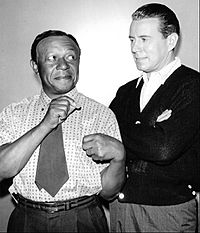
This wasn't the only time a hotel refused Anderson. When the show went to New York, a couple complained about Anderson staying in the same hotel. The show's producer, Hilliard Marks, told the manager that Anderson would leave the next day. When Anderson checked out, Jack Benny and all 44 cast and crew members checked out with him.
Eddie Anderson was one of the highest-paid performers of his time. He was smart with his money and became wealthy. Until the 1950s, he was the highest-paid African American actor. In 1962, Ebony magazine listed him as one of the 100 wealthiest African Americans. Even with all his success, some radio listeners thought he was Benny's actual valet. They would send letters to Benny, scolding him for Rochester's "low salary." In reality, Anderson was rich enough to have his own valet.
People often saw Anderson at Benny's home. This might have made some think he was Benny's valet. Benny held rehearsals for his radio show at his house in Beverly Hills. People on "stars' homes" tours would often see Anderson sitting on Benny's steps, waving and calling out to them.
When Jack Benny brought his show to television in 1950, Eddie Anderson stayed as Rochester. He was part of the TV show until it ended in 1965. In 1953, Anderson appeared as Rochester on The Milton Berle Show. The story was that Milton Berle wanted to hire him away from Benny. He also appeared on Bachelor Father in 1962. In that episode, the family borrowed Rochester, hoping he would teach them to save money like Benny.
Eddie Anderson and Jack Benny had great respect for each other. In 1958, Anderson had a mild heart attack during a rehearsal for a TV special. A photo from Life magazine showed a worried Benny. He was thinking about his friend, not the show. After the TV show ended, they didn't work together for four years. But they still kept in touch. Anderson said, "We always exchange Christmas gifts and he's not as stingy as he pretends to be."
In a 1968 TV special, Benny introduced Anderson as "my lifelong friend, Rochester." Benny asked Anderson to work with him on a new TV series. Anderson joked that Benny's ideas for new shows had already been done. Benny then asked Anderson to come back as his valet. Anderson replied, "Hold it, Blue Eyes, we don't do that any more." In another special, Rochester drove Benny home in a fancy car. Benny complimented the car, and Rochester joked about how Benny got a guest star to work for free.
When Jack Benny passed away in 1974, Eddie Anderson was very sad. He spoke on TV about how much he admired and respected Benny.
Films
Eddie Anderson's movie career started in 1932 with What Price Hollywood?. He played a butler in that film. He appeared in many Hollywood movies throughout the 1930s and 1940s. He first appeared on screen with Jack Benny in the film Man About Town (1939). They also appeared together in Buck Benny Rides Again (1940).
Anderson was in over sixty movies. Some of his famous roles include Noah in The Green Pastures (1936) and Uncle Peter in Gone with the Wind (1939). He played Rochester again in Topper Returns (1941), this time as a different character's valet. He had a main role in the musical film Cabin in the Sky (1943).
The movie Brewster's Millions (1945), which starred Anderson, was banned in some Southern areas. The censors in Memphis said Anderson "has an important role and has too familiar a way about him." They also said the film showed "too much social equality."
Anderson, Benny, and other cast members from The Jack Benny Program also lent their voices to the Warner Bros. cartoon The Mouse that Jack Built (1959). Anderson's last major movie role was as a taxi driver in the comedy It's a Mad, Mad, Mad, Mad World (1963). Jack Benny also had a small part in that movie. In 1975, Anderson was honored by being chosen for the Black Filmmakers Hall of Fame.
Other performances
In 1952, Anderson was a mystery guest on the TV game show What's My Line?. The panelists were blindfolded. When one asked, "Are you brunette?", the audience laughed loudly. Anderson laughed so hard he couldn't answer. In 1957, he played Noah again in a TV version of The Green Pastures. This show was nominated for an Emmy Award.
Anderson also appeared on shows like The Dick Powell Show and Love, American Style. In the early 1970s, he was the voice of Bobby Joe Mason in the cartoon series Harlem Globetrotters and The New Scooby-Doo Movies. In 1972, he tried to return to performing in a nightclub and a Broadway show, but he had to stop due to poor health.
Other business ventures
Eddie Anderson had roles in films and was a dancer. But his biggest success came from The Jack Benny Program. After he became a regular on the show, Anderson opened a nightclub in Los Angeles. However, he was too generous with his friends. The club paid for too many guests, and he had to close it soon after it opened.
During World War II, Anderson owned the Pacific Parachute Company. This was a business owned and run by African Americans that made parachutes for the Army and Navy. He also managed a boxer named Billy Metcalfe in the 1940s.
Anderson was good at business. In 1948, he saw the potential of Las Vegas as an entertainment center. He wanted to build a hotel and casino there where African Americans would be welcome. He tried to find investors, but he couldn't get enough money. So, he couldn't complete his plan. When the Moulin Rouge Hotel, which was an integrated hotel and casino, opened in 1955, Anderson was there for the opening. He said he wished the hotel could have been his.
Personal life
Family
On May 2, 1939, Eddie Anderson married Mamie Wiggins Nelson. She passed away on August 5, 1954, at age 43. They had been married for 15 years. Mamie's son, Billy (Eddie's stepson), was playing professional football for the Chicago Bears at the time. Billy was adopted by Eddie and took his last name.
After Mamie's death, Anderson married Evangela "Eva" Simon on February 8, 1956. They had three children: daughters Stephanie and Evangela Jr. ("Eva"), and a son, Edmund Jr. Simon and Anderson divorced in 1973. Anderson kept custody of his younger son and daughter.
Home
Like many African Americans in entertainment, Eddie Anderson lived in the West Adams area of Los Angeles. This neighborhood was once home to wealthy people. In the Great Depression, many homes there were sold or rented out. By the 1940s, African American entertainers started buying homes in the area, calling it "Sugar Hill."
Some property owners tried to stop Black families from buying homes there. They added rules to their property deeds that said African Americans couldn't buy or live in the houses. But the U.S. Supreme Court said these rules were illegal in 1948.
Anderson wanted to build a home designed by a famous architect named Paul R. Williams. Because of these old rules, he had limited choices for where to build. So, his large, fancy home with a swimming pool stands in an area of smaller homes. The neighborhood children were always welcome at his pool. The street was even renamed because 'Rochester' lived on it.
Hobbies
Eddie Anderson enjoyed building model airplanes and race cars. In 1951, he even designed a life-size sports car for himself. He put a Cadillac engine in it and gave it a sleek, low design. He drove this car and showed it at car shows across the country.
In February 1946, Anderson was on his cabin cruiser boat when it had engine trouble. He and his two friends were lost at sea for a night. They used mirrors, built fires, and flew the boat's flag upside-down to signal for help. A fishing boat finally found them and towed them to the harbor. Anderson didn't realize how worried people were until he heard a news story about the search for him. The next Sunday, he joked about the incident on Jack Benny's radio show.
Horse racing
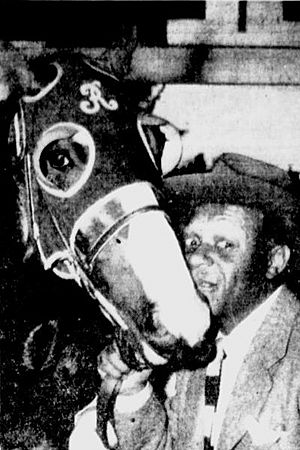
Anderson owned racehorses. His most famous horse was Burnt Cork. This horse ran in the 1943 Kentucky Derby. This made Eddie Anderson the first African American owner to have a horse in the Derby. Benny gave Anderson the day off, so he and his wife, Mamie, went to Kentucky to see the race. Because of segregation rules at the time, they stayed as guests at the home of Mae Street Kidd, a Black politician.
Some people criticized Anderson for entering his horse, saying it was just for publicity. They thought it hurt the race's reputation, especially after Burnt Cork finished last. But a sports writer pointed out that a king's horse also finished last in a big race without similar comments.
When Burnt Cork won an important race, Anderson came to work dressed as a Kentucky colonel. He even insisted on being called "Colonel Rochester."
After the Jack Benny TV show ended, Anderson returned to his love for horses. He worked as a trainer at the Hollywood Park Racetrack until shortly before he passed away. He learned a lot about horses when one of his horses, Up and Over, was badly injured. Doctors suggested putting the horse down, but Anderson refused. He read many books about horse anatomy and found a vet who helped him get the horse back on its feet.
Death
Eddie Anderson passed away from heart disease on February 28, 1977. He was at the Motion Picture & Television Country House and Hospital in Los Angeles, California. He was buried in Evergreen Cemetery, which is the oldest cemetery in the city.
Legacy
In a final act of kindness, Eddie Anderson left his large home to be used to help people recovering from challenges. Today, The Eddie Rochester Anderson Foundation in Los Angeles runs "The Rochester House." This place helps men who have faced difficulties get back on their feet and transition into society. It opened in 1989 and is dedicated to Eddie Anderson's memory.
Anderson's son, Eddie Jr., later started The Eddie "Rochester" Anderson Foundation.
For his important work in radio, Eddie Anderson has a star on the Hollywood Walk of Fame at 6513 Hollywood Blvd. In 2001, he was honored by being added to the National Radio Hall of Fame.
Filmography
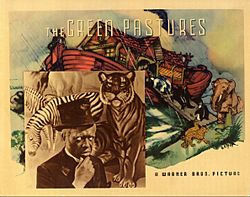
| Year | Title | Role | Notes |
|---|---|---|---|
| 1932 | What Price Hollywood? | James – Max's Butler | Uncredited |
| 1932 | Hat Check Girl | Walter | Uncredited |
| 1932 | False Faces | Chauffeur | Uncredited |
| 1933 | Billion Dollar Scandal | Railroad Steward | Uncredited |
| 1933 | From Hell to Heaven | Sam's Pal | Uncredited |
| 1933 | Terror Aboard | Seaman | Uncredited |
| 1933 | I Love That Man | Charlie, Porter | Uncredited |
| 1934 | [[Behold My Wife! ..... | Old Glory | Uncredited |
| 1937 | Wake Up and Live | Elevator Operator | Uncredited |
| 1937 | Reported Missing! | Porter | Uncredited |
| 1937 | One Mile from Heaven | Henry Bangs | |
| 1937 | On Such a Night | Henry Clay, Fentridge Handyman | |
| 1937 | Over the Goal | William | |
| 1938 | Reckless Living | Dreamboat | |
| 1938 | Jezebel | Gros Bat | |
| 1938 | Gold Diggers in Paris | Doorman | |
| 1938 | You Can't Take It With You | Donald | |
| 1938 | Five of a Kind | Hotel Doorman | Uncredited |
| 1938 | Exposed | William | |
| 1938 | Thanks for the Memory | Janitor | |
| 1938 | Strange Faces | William | |
| 1938 | While New York Sleeps | Janitor | Uncredited |
| 1938 | Kentucky | Groom | |
| 1938 | Going Places | George – a Groom | |
| 1939 | Honolulu | Washington, Mason's Hollywood Servant | |
| 1939 | You Can't Cheat an Honest Man | Rochester | |
| 1939 | You Can't Get Away with Murder | Sam | Uncredited |
| 1939 | Man About Town | Rochester | |
| 1939 | Gone With the Wind | Uncle Peter – Pittypat's Coachman | |
| 1940 | Buck Benny Rides Again | Rochester Van Jones | |
| 1940 | Love Thy Neighbor | Rochester Van Jones | |
| 1941 | Topper Returns | Chauffeur | |
| 1941 | Kiss the Boys Goodbye | George | |
| 1941 | Birth of the Blues | Louey | Credited as Rochester |
| 1942 | Tales of Manhattan | Rev. Lazarus | |
| 1942 | Star Spangled Rhythm | Rochester in "Sharp as a Tack" Number | Credited as Rochester |
| 1943 | The Meanest Man in the World | Shufro | |
| 1943 | Cabin in the Sky | Little Joe Jackson | |
| 1943 | Calling All Kids | Buckwheat | Voice, Short film |
| 1943 | What's Buzzin', Cousin? | Rochester | |
| 1944 | Broadway Rhythm | Eddie | |
| 1945 | Brewster's Millions | Jackson | |
| 1945 | I Love a Bandleader | Newton H. Newton | Credited as Rochester |
| 1945 | The Sailor Takes a Wife | Harry | |
| 1946 | The Show-Off | Eddie | |
| 1959 | The Mouse That Jack Built | Rochester | Voice, Credited as Rochester |
| 1963 | It's a Mad, Mad, Mad, Mad World | Cab Driver | |
| 1970 | Watermelon Man | Drugstore Soda Jerk |
| Year | Title | Role | Notes |
|---|---|---|---|
| 1950–1965 | The Jack Benny Program | Rochester Van Jones | 176 episodes |
| 1952 | What's My Line? | Himself / Rochester | Mystery Guest |
| 1957 | The Red Skelton Hour | Rochester Van Jones | Episode: " Freddie Finds a Headlight" |
| 1957 | Hallmark Hall of Fame | Noah | Episode: "The Green Pastures" |
| 1959 | The Green Pastures | Noah | Television film |
| 1962 | Bachelor Father | Rochester Van Jones | Segment: "Pinch That Penny" |
| 1963 | The Dick Powell Show | Eddie Anderson | Episode: "Last of the Private Eyes" |
| 1968 | It Takes a Thief | Concierge | Episode: "A Thief Is a Thief" |
| 1969 | Love, American Style | Willie | Segment: "Love and the ..." |
| 1970 | Harlem Globetrotters | Bobby Joe Mason | Voice, 22 episodes |
| 1972–1973 | The New Scooby-Doo Movies | Bobby Joe Mason | Voice, 3 episodes |
Images for kids
See also
 In Spanish: Eddie Anderson para niños
In Spanish: Eddie Anderson para niños
 | James B. Knighten |
 | Azellia White |
 | Willa Brown |


